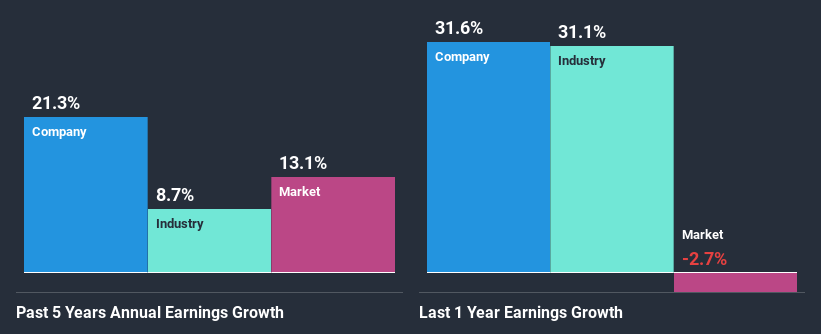Declining Stock and Solid Fundamentals: Is The Market Wrong About UnitedHealth Group Incorporated (NYSE:UNH)?

With its stock down 3.5% over the past month, it is easy to disregard UnitedHealth Group (NYSE:UNH). But if you pay close attention, you might gather that its strong financials could mean that the stock could potentially see an increase in value in the long-term, given how markets usually reward companies with good financial health. In this article, we decided to focus on UnitedHealth Group's ROE.
Return on equity or ROE is an important factor to be considered by a shareholder because it tells them how effectively their capital is being reinvested. In other words, it is a profitability ratio which measures the rate of return on the capital provided by the company's shareholders.
Check out our latest analysis for UnitedHealth Group
How To Calculate Return On Equity?
ROE can be calculated by using the formula:
Return on Equity = Net Profit (from continuing operations) ÷ Shareholders' Equity
So, based on the above formula, the ROE for UnitedHealth Group is:
26% = US$17b ÷ US$68b (Based on the trailing twelve months to June 2020).
The 'return' is the income the business earned over the last year. So, this means that for every $1 of its shareholder's investments, the company generates a profit of $0.26.
What Is The Relationship Between ROE And Earnings Growth?
Thus far, we have learned that ROE measures how efficiently a company is generating its profits. We now need to evaluate how much profit the company reinvests or "retains" for future growth which then gives us an idea about the growth potential of the company. Generally speaking, other things being equal, firms with a high return on equity and profit retention, have a higher growth rate than firms that don’t share these attributes.
UnitedHealth Group's Earnings Growth And 26% ROE
First thing first, we like that UnitedHealth Group has an impressive ROE. Additionally, the company's ROE is higher compared to the industry average of 13% which is quite remarkable. As a result, UnitedHealth Group's exceptional 21% net income growth seen over the past five years, doesn't come as a surprise.
We then compared UnitedHealth Group's net income growth with the industry and we're pleased to see that the company's growth figure is higher when compared with the industry which has a growth rate of 8.7% in the same period.
The basis for attaching value to a company is, to a great extent, tied to its earnings growth. What investors need to determine next is if the expected earnings growth, or the lack of it, is already built into the share price. By doing so, they will have an idea if the stock is headed into clear blue waters or if swampy waters await. Is UNH fairly valued? This infographic on the company's intrinsic value has everything you need to know.
Is UnitedHealth Group Efficiently Re-investing Its Profits?
The three-year median payout ratio for UnitedHealth Group is 28%, which is moderately low. The company is retaining the remaining 72%. So it seems that UnitedHealth Group is reinvesting efficiently in a way that it sees impressive growth in its earnings (discussed above) and pays a dividend that's well covered.
Moreover, UnitedHealth Group is determined to keep sharing its profits with shareholders which we infer from its long history of paying a dividend for at least ten years. Existing analyst estimates suggest that the company's future payout ratio is expected to drop to 21% over the next three years. Regardless, the ROE is not expected to change much for the company despite the lower expected payout ratio.
Summary
In total, we are pretty happy with UnitedHealth Group's performance. Particularly, we like that the company is reinvesting heavily into its business, and at a high rate of return. Unsurprisingly, this has led to an impressive earnings growth. Having said that, the company's earnings growth is expected to slow down, as forecasted in the current analyst estimates. Are these analysts expectations based on the broad expectations for the industry, or on the company's fundamentals? Click here to be taken to our analyst's forecasts page for the company.
This article by Simply Wall St is general in nature. It does not constitute a recommendation to buy or sell any stock, and does not take account of your objectives, or your financial situation. We aim to bring you long-term focused analysis driven by fundamental data. Note that our analysis may not factor in the latest price-sensitive company announcements or qualitative material. Simply Wall St has no position in any stocks mentioned.
Have feedback on this article? Concerned about the content? Get in touch with us directly. Alternatively, email editorial-team@simplywallst.com.



